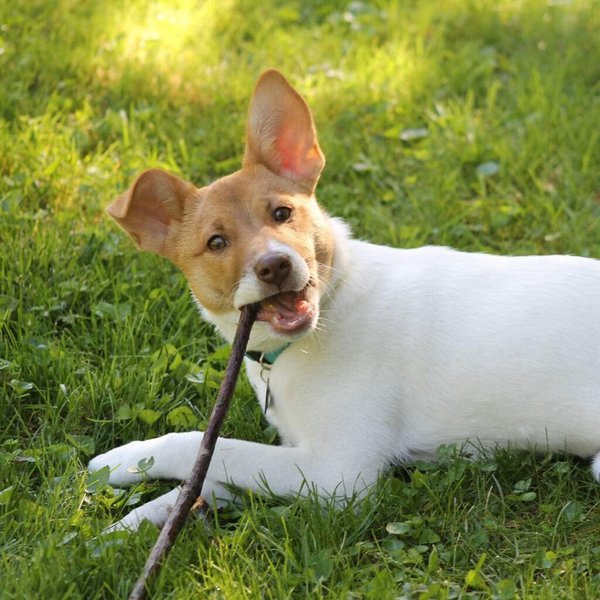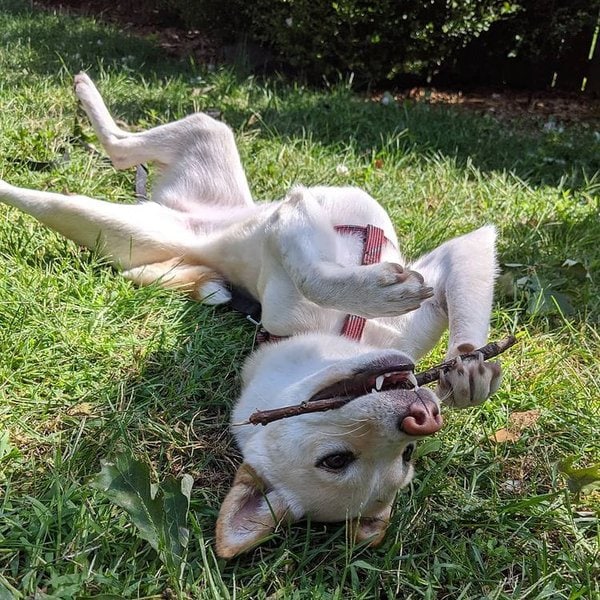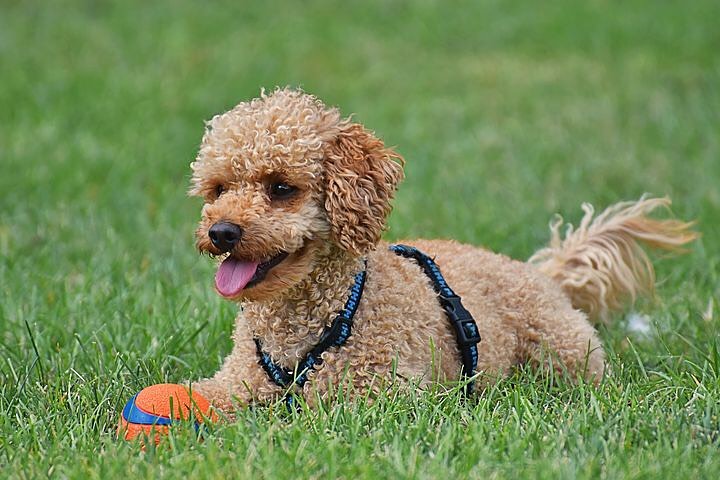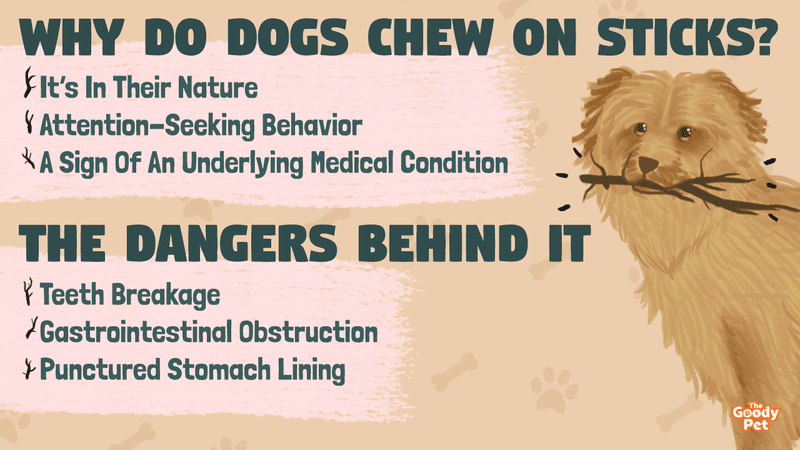If you have ever seen your pooch chewing a stick, you will notice that the stick keeps them entertained for a long time – some dogs might even chew on a stick for over an hour. This might make you question if it is safe for your dog to chew on sticks.
No, it is not safe for dogs to chew on sticks. Allowing a dog to continuously chew on sticks is dangerous and can have potentially fatal consequences on the dog’s general health and well-being if not curbed.
So, what’s so special about sticks? Stick chewing by a dog is a habit that is typically born out of nature, but it can also be an indicator of a health or psychological issue with a pooch. That said, this article examines some of the dangers of allowing your pooch’s stick-chewing tendencies to go unchecked, as well as steps you can take to curb this behavior. However, before we go further, let’s take a look at some of the reasons dogs are particularly fond of chewing on sticks.
Why Do Dogs Chew On Sticks?

Dogs naturally love chewing on things and putting stuff in their mouth, and since sticks are readily available outdoors, it’s only normal that they take to chewing on sticks.
Another reason dogs chew on sticks is to grab their owner’s attention, and in the same vein, stick chewing by a dog can indicate a medical condition.
It’s In Their Nature
It has always been one of the natural instincts of dogs right from the beginning of time to chew on sticks.
The ancestors of dogs were known for using their immediate environments to clean and groom their bodies. And as a result, ancient dogs developed a habit of chewing on sticks and stones to exercise their teeth, get rid of dirt lodged in their mouth, and keep their dentition clean and strong.
Dogs often look at sticks as bones, and who can blame them? Sticks are typically shaped in an oblong manner like bones and offer plenty to munch on.
Sticks also provide dogs with a gratifying workout and the opportunity to exercise their jaws and teeth. And although chewing on sticks doesn’t taste the same way as chewing on bones, it must feel good to dogs.
Attention-Seeking Behavior
Some dogs chew on sticks to seek attention; This is very common in dogs that are bored, attention-deprived and seeking a means of getting their owners’ attention.
After working long during the day and coming home, due to over-excitement and demand for attention, a dog may take to chewing on inappropriate objects such as sticks to make its presence known.
And if this stick-chewing behavior elicits a sort of response from the owner, you can expect the frequency of the pooch’s stick chewing to further increase.
Stick Chewing Can Be A Sign Of An Underlying Medical Condition
Pica is a medical condition that is characterized by a pooch’s obsessive and compulsive desire to chew on non-food substances. And if you observe your pooch chewing non-stop on that piece of wood, chances are that the dog is suffering from pica.
Causes of pica in dogs vary, and they range from improper feeding to hormonal deficiencies and the presence of primary diseases like diabetes. It is also worth noting that certain dog breeds, like the Labrador Retriever, are more prone to suffering from pica compared to other dogs.
Is It OK For My Dog To Chew On Sticks?

Chewing sticks may look like a natural habit for dogs, but it can also be dangerous.
Using sticks to play catch a few times might not cause any health issues; however, allowing your dog to chew sticks continuously can potentially have serious medical implications.
Effect On Teeth
When dogs chew on sticks, small splinters, slivers and even pieces of wood can be stuck between the dog’s teeth or someplace in the dog’s mouth. Chewing on sticks requires a great amount of force, and chewing on something as tough as wood can cause the breakage of teeth.
Broken teeth can lead to serious pain, possible infections as well as dental abscesses. That said, dental abscesses are extremely painful and can lead to swelling in the affected area. And with pieces of wood floating around in the pooch’s mouth, such a dog is prone to suffering from tissue infection.
Gastrointestinal Obstruction
Woods and sticks are not easily digestible, and when twigs remain in the intestines or stomach of your dog, it can lead to gastrointestinal obstruction. And when not properly resolved through surgery and treatment, a gastrointestinal blockage or obstruction can prove to be quite fatal.
Stick chewing by dogs also poses a risk of foreign body obstruction due to the pylorus in the stomach being blocked, and this can in turn, result in peritonitis infection which arises from the subsequent puncturing of the intestines.
Other Health Risks Of Dogs Chewing Sticks
Having stick pieces stuck in a dog’s mouth will eventually lead to such a dog swallowing these splinters without even realizing it. And while little pieces of wood or thin splinters may not seem too bad on paper, in reality, they can lead to punctured stomach lining or esophagus.
If any of these issues happen due to your dog’s stick-chewing tendencies, such a dog will require special medical attention to be fixed.
Apart from stick-chewing putting such a dog’s life in great danger, medical procedures designed to treat health issues that may arise due to this behavior are usually very expensive!
How Do I Get My Dog To Stop Chewing On Sticks?
Chewing has its benefits to a dog’s health but it does not necessarily have to be a stick. Due to advancements in time and technology, these days there are plenty of toys available for dogs to chew on rather than sticks.
And you can protect your dog from any health risks associated with chewing sticks by providing it with plenty of toys of different textures.
Provide Your Dog With Toys
There are plastic toys available that, as well as curbing your dog’s tendency to chew on sticks, are very beneficial to your dogs’ health and dental hygiene. Dogs love chewing stuffed animals and the feeling that comes with the fabric of the stuffed animals or toys rubbing on their gum.
One notable example of a chew toy that can help correct your dog’s obsession with chewing sticks is the Chew King Fetch Balls. The toy balls are made from a natural and durable rubber material that can withstand light to moderate chewing by dogs, and they also come in handy when playing fetch with your pooch.
Keep Your Dog Active
Dogs can act up when they have a lot of energy, and a bored dog with an excess amount of energy and nothing to do is a recipe for disaster.
Spending time with your furry companion can help with expelling excess energy and curing boredom which will, in turn, make your dog better behaved. Playing catch, taking your doggie on walks, and other fun activities can also go a long way in helping entertain your dear fido.
Clean up
Cleaning up your yard can go a long way in ensuring your doggie does not chew on sticks. And while this may seem like a tedious task, trust us when we say it is well worth the effort.
Ensure you remove branches, logs, sticks, and any other pieces of wood from where your dog has access. It is also important to cover up your firewood pile if you have one. Fencing can also be applied if necessary.
Mental Training
Provide your furry friend with mental stimulation and exercise to help them get their mind off sticks whenever they are bored. There are brain training games that can deepen your bond with your dog and reduce any destructive behaviors.
You can also reward your dog with treats for good behavior. This will make your furry friend want to do the right thing and be obedient.






